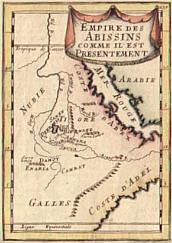 According to the most recent news accounts, Ethiopian forces have driven the Islamists out of Mogadishu and returned control of the capital to the official Somali government.
According to the most recent news accounts, Ethiopian forces have driven the Islamists out of Mogadishu and returned control of the capital to the official Somali government.
The leaders of the Islamist alliance that held most of the country until this week have resigned, SomaliNet news agency reported. “Since the Islamists came to power in Somalia, they did a lot of significant acts for the people, particularly in terms of security, justice, development, improving internal and foreign politics, reopening the air and sea ports and so on,” the outgoing leadership said in the statement.
Islamist fighters are said to have handed their weaponry to warlords in the Mogadishu area.
These were the same mujahideen who swore their dedication to martyrdom as recently as yesterday. Apparently not all of them were ready for the blandishments of the seventy-two black-eyed ones.
A few days ago The Scotsman reported a different line coming from the Islamist leadership:
The Somalia Islamic Courts Council’s (SICC) website hailed “mujahideen” troops who, it said, chanted passages from the Koran as they went into battle against militarily superior Ethiopian “crusaders”. Ethiopia is a largely Christian nation.
The battle for Mogadishu occupies just a small section of the long, convoluted, and bloody border between Islam and the rest of the world. The Ethiopian government is not attacking the Somalis to convert them to Christianity, but the Somali mujahideen obviously do consider this a struggle between their religion and the barbarian faiths of Ethiopia. They called a jihad, and asked for assistance from faithful Muslims all over the world in their fight. Unfortunately, their fellow jihadis failed to arrive ahead of the Ethiopian Air Force.
The Scotsman supplied no URL for the website of the Somalia Islamic Courts Council. A search for it turned up Golaha Maxaakiimta Islaamiga Soomaaliyeed, which may be it. Unfortunately, it’s entirely in the Somali language.
There are, however, various other Somali jihad blogs and websites dedicated to the same cause and writing in English. One of them is the Islamic Courts Council, run by Abusayfullaah As-Somaali. He hasn’t posted for a week, which may or may not be significant.
Here’s a quote, concerning the fighting at Baydhabo:
Shabelle News managed to speak to Shaykh Indho-adde (white eyes) over the phone.
He told Shabelle by the phone that the fighting was going on between the Ethiopian forces and the Islamic Courts fighters, indicating that he does not recognize the internationally backed government in Somalia. “I would be pleased to die in the Jihad (a holy war) while I was killing the Christian Ethiopian troops that forcefully occupied our country”, he said. “We will not halt the war until our forces reach the border between Somalia and Ethiopia”, he added.
Notice the emphasis on Christian Ethiopian troops.
– – – – – – – – – –
Another Somali Islamist blog is The Ignored Puzzle Pieces of Knowledge, where the blogger is one InshAllahShaheed.
In Somalia, the Jihad fe Sabeelillah against the Crusaders has been going on for a few days, walhamdullilah. The disgraceful Ethiopian Kafireen have started to cowardly fight the Somalians by using warplanes and jets like their cowardly counterparts: the Americans and their allies.
Those sissy school girls backed by the United Snakes of Amerikkka are too cowardly to fight like men on the ground with guns. AllahuAkbar, the Somalian Mujahideen are showing Sabr and are moving forth fe Sabeelillah without fearing death.
I don’t know where InshAllahShaheed hails from, but “United Snakes of Amerikkka”?? Does he hang out at Daily Kos when he’s off-duty from the jihad?
As a matter of interest, InshAllahShaheed has a whole page of video links for miscellaneous jihad war footage and snuff videos. I don’t recommend them to the faint of heart.
The struggle in the Horn of Africa between the Muslims on the coast and the Christians of the highlands has been going on for a long time. A little bit of history is in order.
* * * * * * * * * * * * * * *
Ethiopia (also known as Abyssinia, from the name of its highland regions) has been a major power in sub-Saharan Africa since the beginning of history. A large Jewish contingent was represented there as early as the eighth century B.C., having migrated overland from Egypt, or across the Red Sea from the Arabian Peninsula.
Christianity came southwards from Egypt to Abyssinia in the fourth century. After the initial period of conversion, the Ethiopian Church came under the authority of the Coptic Church in Egypt, with a Primate appointed by the Patriarch of Cairo. Christianity eventually became the predominant religion in Ethiopia, though the country has been a patchwork of faiths since the earliest days.
The Islamic conquests in the seventh and eighth centuries cut Ethiopia off from the rest of Christendom. The Legions of the Prophet subdued Egypt and Nubia (Sudan), and occupied the littoral along the Red Sea and around the Horn, but the Islamic tide washed up against the highlands of Abyssinia and then receded.
At the end of the Dark Ages, Portuguese mariners set sail around Africa and into the Indian Ocean, looking for the fabled Far Eastern Christian kingdom of Prester John. When they discovered the Christians of Ethiopia, they thought they had found what they were looking for.
At the time the Ethiopians were under duress from the onslaught of the newest Legions of the Prophet, the forces led by the Sultan of the Ottoman Empire. They asked the Portuguese for help, and in 1542 battle was joined by an alliance of European and African Christians against the Islamic army of the Turks. At first the Portuguese were defeated, but the following year they gained a decisive victory and the Turks were forced to withdraw.
From the Portuguese point of view, the Abyssinians practiced a strange and aberrant form of Christianity, and the Europeans saw it as their duty to correct their doctrine and bring Ethiopia under the authority of the Church of Rome. The Ethiopians, however, would have none of it, and relations between the two countries soured. The Jesuits stayed on for a while, at first tolerated, later despised, and finally expelled.
Ethiopia remained in its remote isolation from the rest of the Christian world until the great European colonial push of the nineteenth century. The French, the Italians, and the British all had encounters of various kinds with Ethiopia, but none was able to make the country into a colony. The British invaded and defeated Abyssinia in 1868, but did not remain in occupation. The Italians fought the Ethiopians at Adowa in 1896, and were astonished to be defeated by a large native force equipped with French weaponry.
Mussolini avenged this affront to Italian dignity by invading, occupying, and annexing Ethiopia in 1936. The period between 1936 and 1941 was the only time in history in which Ethiopia was actually conquered by a foreign power.
The Communist virus infected Ethiopia in 1974 when Emperor Haile Selassie was overthrown and a Marxist dictatorship established. During seventeen years of Communist rule the Ethiopian economy was laid to waste, famine raged through the land, and border clashes were fought with Eritrea and Somalia.
The Church was severely persecuted under the Communists — the Patriarch was murdered by them in 1974 — but rebounded after the re-establishment of representative government in 1991. Ethiopia remains primarily Christian today.
* * * * * * * * * * * * * * *
Considering this history, it’s no wonder that Ethiopia views the situation in Somalia with alarm: jihad has appeared on their borders yet again. The rest of us are fortunate that they were willing to mount a counterjihad against Mogadishu.
One assumes that our government gave them plenty of tacit encouragement to do the job. After all, they were ideal for the task — they know the terrain, speak the language, and have a real vested interest in completing the task.
Not only that, they are not going to be encumbered with the same Rules of Engagement which would tie the United States or NATO into procedural pretzels. It’s also unlikely that they will concern themselves overmuch with the Geneva Conventions as they apply to Islamic terrorists.
The big question is: what comes next? Somalia has been ungovernable for nearly twenty years. Can the Ethiopians force stability on a bunch of Taliban-wannabes, feuding warlords, and backward tribesmen?
Let’s see if the Legions of Abyssinia can accomplish what the United States and the UN so signally failed to do.

Resources on the history of Ethiopia:
Voyage to Abyssinia (Father Lobo’s 1622 account)
History of Ethiopia
Emperors of Ethiopia
 Which brings us to General Syed Pervez Musharraf. On September 10th, 2001, this stalwart friend of the United States was anathema. Under his aegis Pakistan’s ISI had nurtured, brought to power, and maintained the Taliban in power in neighboring Afghanistan. The brutes in Kabul were Musharraf’s and Pakistan’s little Islamist hobby, a way to allow those boisterous military types in the ISI to get their jollies without upsetting the applecart back in Islamabad. Add the Islamic Bomb to the equation, and Pakistan could only be consigned to the Outer Darkness of our foreign policy.
Which brings us to General Syed Pervez Musharraf. On September 10th, 2001, this stalwart friend of the United States was anathema. Under his aegis Pakistan’s ISI had nurtured, brought to power, and maintained the Taliban in power in neighboring Afghanistan. The brutes in Kabul were Musharraf’s and Pakistan’s little Islamist hobby, a way to allow those boisterous military types in the ISI to get their jollies without upsetting the applecart back in Islamabad. Add the Islamic Bomb to the equation, and Pakistan could only be consigned to the Outer Darkness of our foreign policy. Look at it this way: suppose A. Q. Khan had done his work a little faster, or imagine that the DPRK and Saddam had been able to work out a mutually acceptable deal back in the 1990s. Pretend that when March 2003 rolled around, Saddam had a dozen or so Scud-B missiles tipped with 20-kiloton nuclear warheads, warheads that he could lob into Tel Aviv, Incirlik, or Kuwait, or at the U.S. fleet in the Persian Gulf.
Look at it this way: suppose A. Q. Khan had done his work a little faster, or imagine that the DPRK and Saddam had been able to work out a mutually acceptable deal back in the 1990s. Pretend that when March 2003 rolled around, Saddam had a dozen or so Scud-B missiles tipped with 20-kiloton nuclear warheads, warheads that he could lob into Tel Aviv, Incirlik, or Kuwait, or at the U.S. fleet in the Persian Gulf.

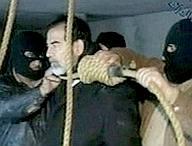 Did you watch the video of Saddam’s death? I did; so did the Baron. We discussed it at dinner, and the future Baron said he would avoid it, as he had the other grisly videos from the Middle East propaganda machine. The Baron and I demurred: sometimes it is important to bear witness. We had both forced ourselves to look at the film footage of the Jewish survivors in the camps of World War II. We would also watch the final moments of a twisted human being who had bought death, destruction, and a cruel reign to twenty five million people. Those people deserved our attention as surely as Saddam had given them his close personal scrutiny. As
Did you watch the video of Saddam’s death? I did; so did the Baron. We discussed it at dinner, and the future Baron said he would avoid it, as he had the other grisly videos from the Middle East propaganda machine. The Baron and I demurred: sometimes it is important to bear witness. We had both forced ourselves to look at the film footage of the Jewish survivors in the camps of World War II. We would also watch the final moments of a twisted human being who had bought death, destruction, and a cruel reign to twenty five million people. Those people deserved our attention as surely as Saddam had given them his close personal scrutiny. As  An American woman has been refused treatment by a doctor in Blekinge in southern Sweden because of her nationality. The woman’s husband has now reported the incident to the Medical Responsibility Board.
An American woman has been refused treatment by a doctor in Blekinge in southern Sweden because of her nationality. The woman’s husband has now reported the incident to the Medical Responsibility Board. His idea generated a lot of local enthusiasm. Donations poured in to help him fund the races, with at least one case of a $1,000 gift. Now he’s ready: the first race was officially run last night while local Muslims were at their Friday prayers.
His idea generated a lot of local enthusiasm. Donations poured in to help him fund the races, with at least one case of a $1,000 gift. Now he’s ready: the first race was officially run last night while local Muslims were at their Friday prayers.
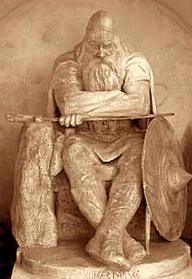 According to the chroniclers, Holger had previously done battle with the Franks over their incursions into Danish territory. But in 732 the menace of the Saracens forced him to set aside his differences with Charles Martel and journey southwards to fight side-by-side with the Frankish forces against the common enemy.
According to the chroniclers, Holger had previously done battle with the Franks over their incursions into Danish territory. But in 732 the menace of the Saracens forced him to set aside his differences with Charles Martel and journey southwards to fight side-by-side with the Frankish forces against the common enemy. But the fairest sight of all is the old castle of Kronborg, and under it sits Holger Danske in the deep, dark cellar which no one enters; he is clad in iron and steel and rests his head on his stalwart arm; his long beard hangs down upon the marble table where it has become stuck fast; he sleeps and dreams, but in his dreams he sees everything that comes to pass in Denmark. Every Christmas Eve an angel of God comes to tell him that all he has dreamed is true, and that he may go to back to sleep again, for Denmark is not yet in any danger! but if it should ever come, then old Holger Danske will rouse himself, and the table will break apart as he pulls out his beard! Then he will come forth, and strike a blow that shall be heard throughout all the countries of the world.
But the fairest sight of all is the old castle of Kronborg, and under it sits Holger Danske in the deep, dark cellar which no one enters; he is clad in iron and steel and rests his head on his stalwart arm; his long beard hangs down upon the marble table where it has become stuck fast; he sleeps and dreams, but in his dreams he sees everything that comes to pass in Denmark. Every Christmas Eve an angel of God comes to tell him that all he has dreamed is true, and that he may go to back to sleep again, for Denmark is not yet in any danger! but if it should ever come, then old Holger Danske will rouse himself, and the table will break apart as he pulls out his beard! Then he will come forth, and strike a blow that shall be heard throughout all the countries of the world. I can recommend this fascinating video (apparently produced in the Netherlands) about the DPRK, entitled
I can recommend this fascinating video (apparently produced in the Netherlands) about the DPRK, entitled  According to the
According to the  Steen of
Steen of  Steen sent this followup note:
Steen sent this followup note:



 The “Sheikh Gilani Lane” street sign can’t be made out from the air, but you can be sure that it’s still there.
The “Sheikh Gilani Lane” street sign can’t be made out from the air, but you can be sure that it’s still there.
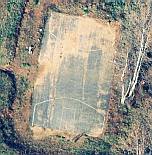
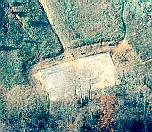
 Not only that, but the paved area is not completely level. In this detail shot you can see that it has less of a slope than the surrounding hillside, but is still canted. If anyone has any other guesses about what it might be, please leave them in the comments.
Not only that, but the paved area is not completely level. In this detail shot you can see that it has less of a slope than the surrounding hillside, but is still canted. If anyone has any other guesses about what it might be, please leave them in the comments.

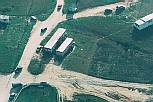
 There have been reports that some of the lower-ranking people in the Jamaat ul-Fuqra compounds are unaware of the terrorist nature of the organization and its more dangerous activities. With that in mind, the Christian Action Network printed and dropped hundreds of leaflets from the air on Sheikh Gilani Lane. Each one featured an arrow pointing to a photo of the Sheikh, with a label that read, “This man — known TERRORIST, known MURDERER, ANTI-AMERICA — is honored with a road sign in Charlotte County, Virginia.”
There have been reports that some of the lower-ranking people in the Jamaat ul-Fuqra compounds are unaware of the terrorist nature of the organization and its more dangerous activities. With that in mind, the Christian Action Network printed and dropped hundreds of leaflets from the air on Sheikh Gilani Lane. Each one featured an arrow pointing to a photo of the Sheikh, with a label that read, “This man — known TERRORIST, known MURDERER, ANTI-AMERICA — is honored with a road sign in Charlotte County, Virginia.”
 Those clever fellows in the MSM never miss an opportunity to put a little kink in their news
Those clever fellows in the MSM never miss an opportunity to put a little kink in their news